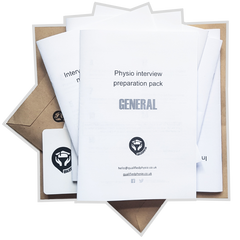When looking for a physiotherapy job, you'll need to go through an interview (sometimes several). The job interview is a great way for the hospital / trust / department to assess if you’re qualified for the position you’re applying for.
While the way an employer conducts the interview, the questions they ask and the interview’s duration will vary from trust to trust, in general NHS interviews will have a similar structure, which allows you to prepare for yours.

The typical interview is divided into sections.
General/career motivation questions where the interviewer would like to obtain information about you and your career motivation to become a physiotherapist, and your enthusiasm to join their organisation. These questions do not usually have a right or wrong answer, but it is your opportunity to impress the panel and make a good impression.
Examples include: ‘what was your motivation for applying for the role, why do you think you would be a good candidate for this role, tell us a bit about yourself and your background, what might you find challenging in this role, how does your previous experience prepare you for this role?’ As you can see, the questions are all very similar and are designed to start give you the opportunity to introduce yourself and ‘break the ice’.
Clinical questions/scenarios where you would be asked to demonstrate clinical skills and knowledge or respond to a specific clinical scenario. This is the ‘meat’ of the interview, and where you will spend the most time answering questions to clinical scenarios, demonstrating your clinical reasoning through the subjective, objective and red flag assessment, differential diagnosis and treatment plan. It will also be expected that you can demonstrate a few common outcome measures used during assessment. We will cover a few of these later.
Knowledge questions usually test the level of professional knowledge about organisation or Trust, the role and what you have learned from your studies and placements. The level of detail required in the answer will reflect the seniority of the position you are applying for – as a rule, a band 5 or junior level position ‘only’ requires a level of detail that is reflected in your university studies and placement experience, i.e. you are not expected to be able to demonstrate an in-depth understanding of diagnostics, complex patient treatment or back up your answers with significant literature or evidence, although in the case of the latter we recommend having a few references prepared as it makes a very good impression on the panel.
Competency questions where you are required to provide examples to demonstrate skills and qualities described in the person specification and job description. This may include showing that you understand the difference between being a student and being a band 5 (autonomy, scope of practice etc), or that you know how an MDT works, the discharge process and be familiar with common policies or guidelines. It can also include questions related to ‘hard skills’, such as being able to complete a neurological assessment (myotomes, dermatomes, reflexes, Babinski, clonus etc.), complete special/orthopaedic tests (Hawkings-Kennedy, McMurrys etc), handle equipment (hoist, rollator frame, walking stick), manual handling (transfers, mobility support etc.).
These questions have a right and wrong answer and require you to demonstrate your understanding of the field. This is opposed to ‘values-based’ questions which are looking into how you personally would deal with a situation – such as: ‘you are seeing a patient who becomes tearful/angry/confused during a session, how would you communicate with them?’ – these type of questions can have many different answers based on how you interpret the question and how you personally prefer to deal with those scenarios.
Caseload management – these questions are designed to determine how organised you are, and if you are conscious about the different ways you can manage your time and tasks. For instance, by prioritise your day/patients, what strategies you have put in place to stick to time, complete discharges and referrals etc. Other examples include building a good relationship with your supervisor and colleagues, attending in service training, identifying own learning needs, discussing complex patients with the MDT, reviewing outcomes regularly etc.
Trust values and local policies (e.g.: falls policy). All UK trusts have started introducing trust values, a list of 4-6 words that describe to the public what they can expect from the care delivered at any trust. On one hand it is a PR exercise designed to provide the public with a sense of confidence in the trust, but on a larger scale defining values has become a normal part of a business strategy for both the private and public sector. These words are usually quite predictable and will be available on the trust website – it is important to look them up in preparation for the interview. You will not be expected to list them in the interview, but you can refer to them as part of your answers, and one question related to values can come up in the interview: how will you demonstrate the trust values in your role? In this situation it is best to pick a value and give a concrete example for how you will demonstrate it, for example you can demonstrate the value ‘respectful’ by showing an understanding for cultural or religious requirements in certain demographics – where patients might be more comfortable seeing a male/female therapist or being aware of Ramadan / other religious holidays when planning activities.
Conflict resolution – these questions are usually scenario specific conflicts between you and a patient, colleague, or manager, or between two other groups of people that you observe (administrative/nursing staff and a patient). The panel want to see how you would react in this scenario, and this is a good opportunity to demonstrate ‘'soft skills’ - which are centred around personality traits such as empathy, caring, respect, active listening etc. This is also a good opportunity to link back to the trust values as mentioned in the last section.
Related products


![[2022] Band 5 / Junior MSK Physiotherapy interview question & its answer explained](http://qualifiedphysio.co.uk/cdn/shop/articles/pexels-andrea-piacquadio-3756042_compact.jpg?v=1641201968)

